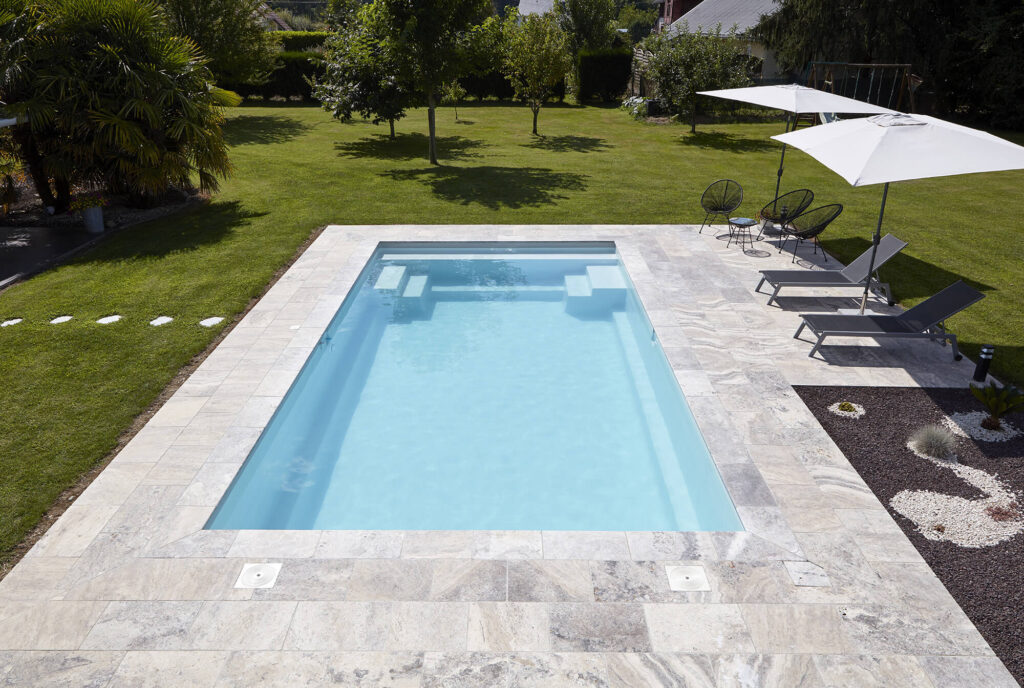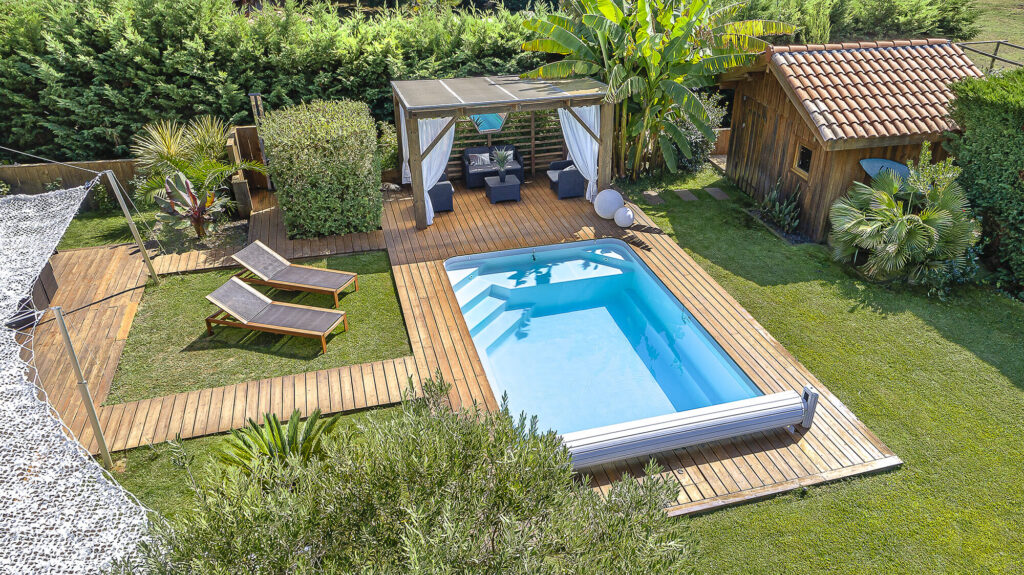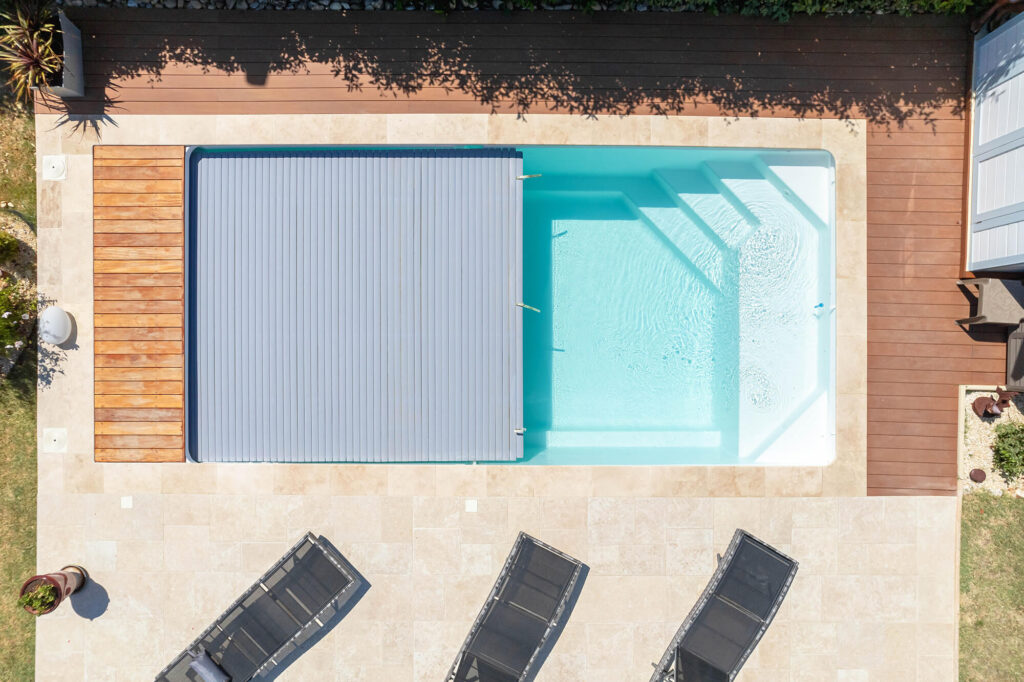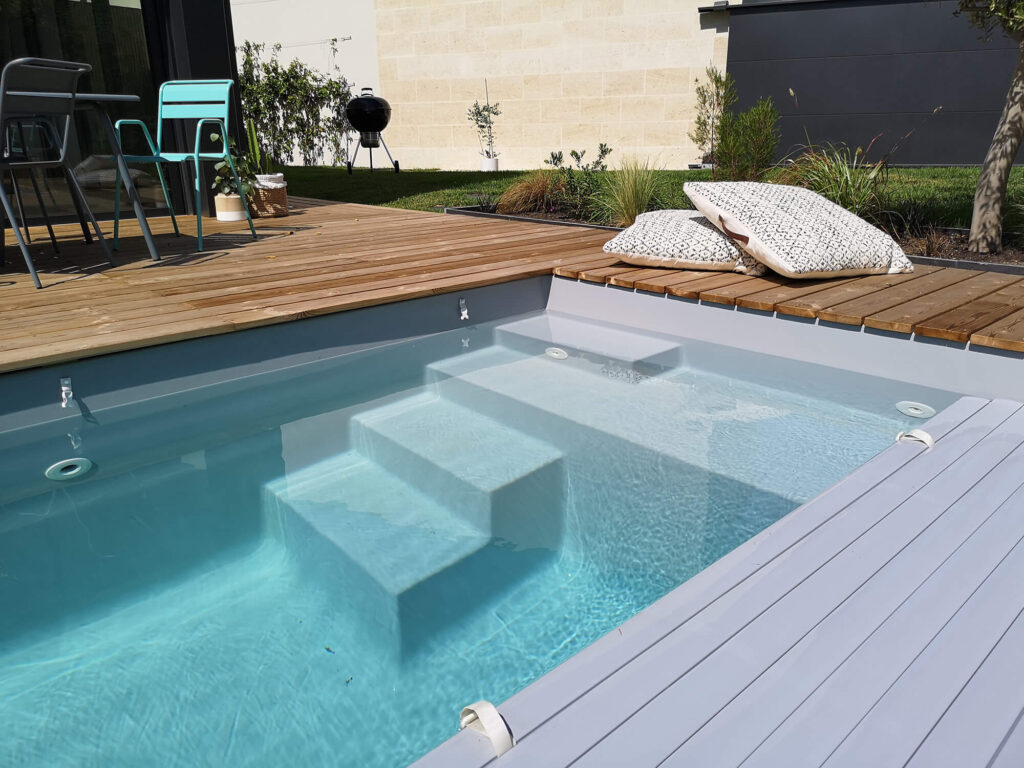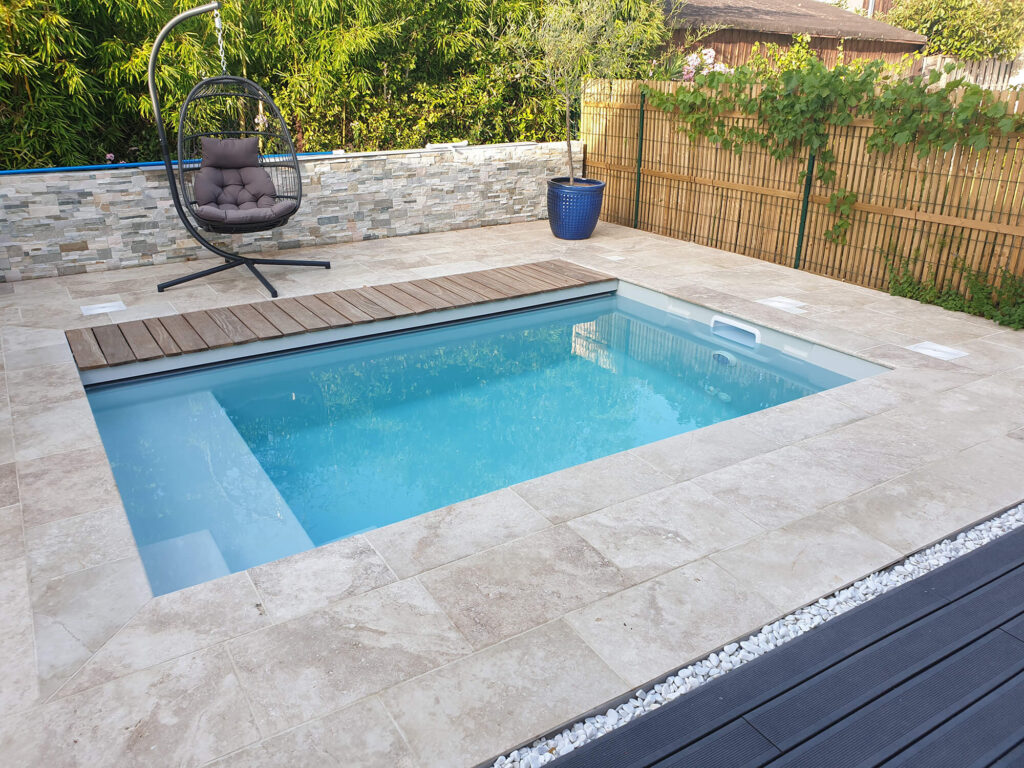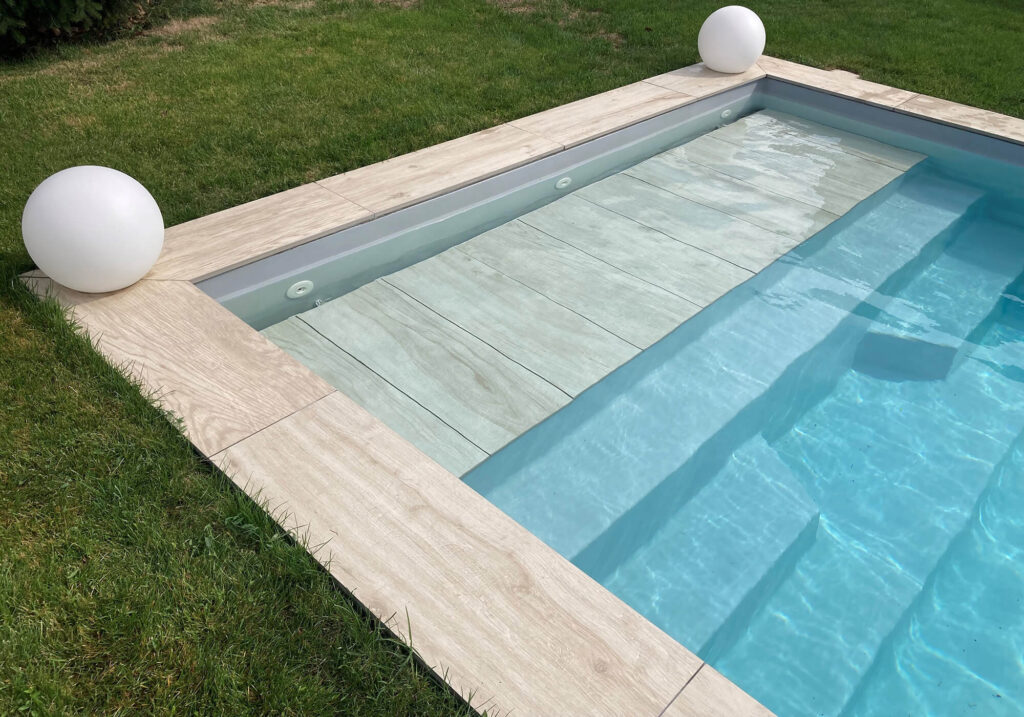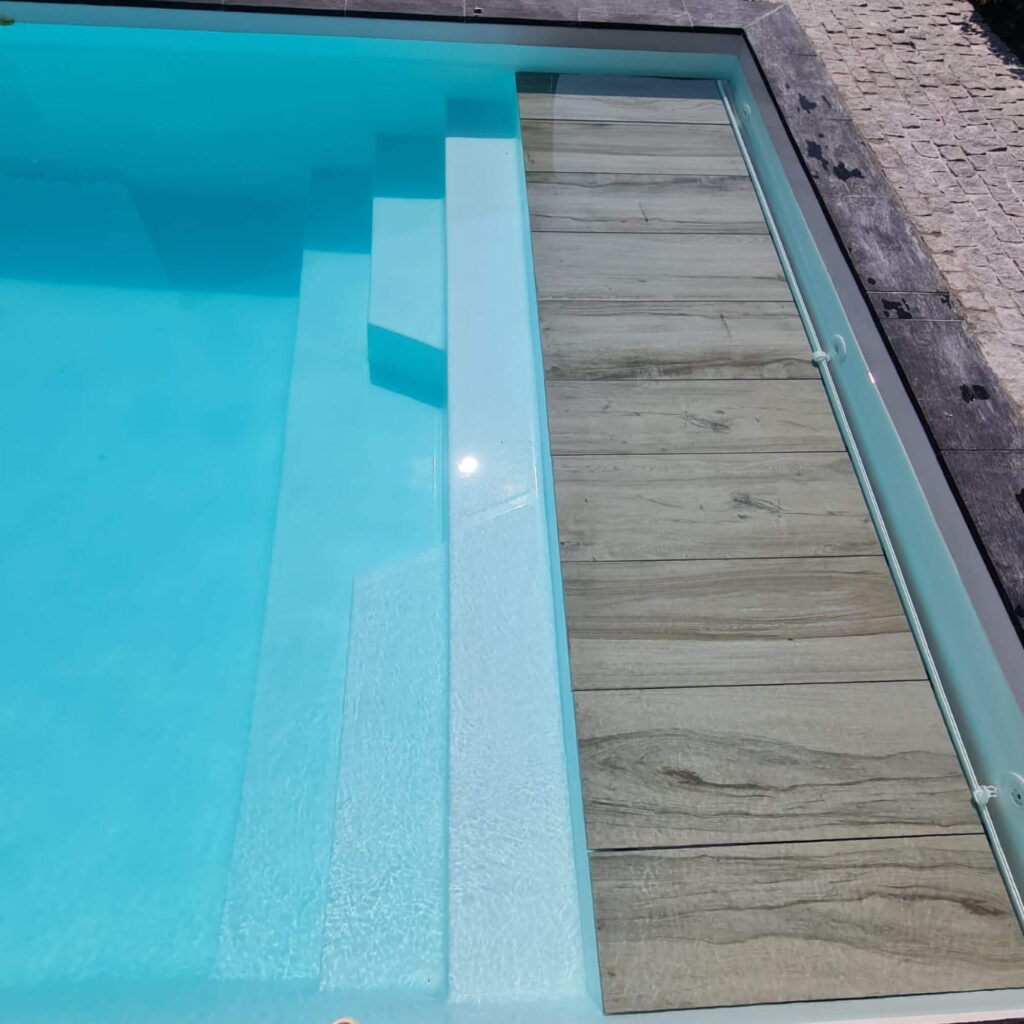En France, la piscine au sel séduit de plus en plus de propriétaires qui souhaitent allier confort de baignade, praticité et respect de l’environnement. Longtemps réservée aux piscines haut de gamme, cette solution se démocratise grâce à des systèmes de traitement de l’eau plus accessibles et performants.
Mais avant d’opter pour ce type d’installation, une question essentielle se pose : quels sont les véritables avantages et inconvénients du traitement au sel ? Entre confort, coûts et entretien, Aboral Piscines vous propose un panorama complet pour vous aider à faire le bon choix.
Comment fonctionne une piscine au sel ?
Contrairement aux idées reçues, une piscine au sel n’est pas une piscine « sans chlore ». Elle repose sur un principe bien connu : l’électrolyse au sel.
Concrètement, on ajoute une petite quantité de sel dans l’eau de la piscine (généralement entre 2,5 et 4 grammes par litre, soit environ 9 fois moins que dans l’eau de mer). Ce sel est ensuite transformé par électrolyse : grâce à des courants électriques appliqués dans l’électrolyseur au sel, les ions contenus dans l’eau se transforment en chlore naturel.
Ce processus permet de produire du chlore automatiquement, de manière continue, ce qui garantit une désinfection efficace sans ajout régulier de produits chimiques. Une fois son rôle désinfectant terminé, le chlore se retransforme en sel présent dans l’eau, et le cycle recommence.
C’est donc un système de traitement de l’eau en circuit fermé, qui limite les interventions manuelles et assure une meilleure régularité de la qualité de l’eau.
Les avantages d’une piscine au sel
1. Le confort de baignade
Le premier avantage d’une piscine au sel réside dans le confort ressenti lors de la baignade. Et pour cause, l’eau salée est plus douce pour la peau et les yeux car elle ne contient pas de stabilisant chimique en excès. Elle évite les irritations cutanées et les allergies parfois provoquées par le chlore.
De plus, l’odeur caractéristique du chlore disparaît, ce qui rend l’expérience bien plus agréable.
C’est donc une solution idéale pour les familles, en particulier si des enfants se baignent régulièrement.
2. Une solution plus naturelle et écologique
Avec le traitement au sel, on réduit significativement l’utilisation de produits chimiques. Le sel étant naturellement présent sur Terre, il s’agit d’un élément simple, non toxique et recyclable.
Par ailleurs, contrairement à une piscine traitée uniquement au chlore liquide ou en galets, une piscine au sel produit elle-même son désinfectant via l’électrolyse. Ce fonctionnement limite l’impact environnemental, et réduit la manipulation de produits chimiques par l’utilisateur.
3. Des économies sur le long terme
Même si l’investissement initial est plus élevé, une piscine au sel devient intéressante sur le long terme. Et cela, pour plusieurs raisons :
- Le sel coûte bien moins cher que les produits chimiques classiques.
- Le cycle de transformation (sel → chlore → sel) fait que la quantité de sel à ajouter est faible et ne doit être renouvelée que rarement.
- Le système de traitement automatique permet de consommer moins de correcteurs chimiques, à condition de disposer d’un bon régulateur de pH pour stabiliser le niveau de pH.
Sur plusieurs années, les propriétaires constatent une baisse notable du budget d’entretien.
4. Un entretien simplifié
Une piscine au sel offre un entretien plus simple qu’une piscine traditionnelle :
- L’électrolyseur au sel se charge de la production de chlore sans intervention manuelle.
- Le système de filtration et l’électrolyse assurent une eau désinfectée en continu.
- Il suffit de contrôler régulièrement le taux de sel dans l’eau, le niveau de pH, et de vérifier que la cellule fonctionne correctement.
Pour optimiser la durée de vie du matériel, il faut nettoyer régulièrement la cellule de l’électrolyseur, mais cette opération reste peu contraignante comparée aux manipulations fréquentes d’un traitement au chlore classique.
Traitement au sel d’une piscine : les inconvénients à connaître
1. Un coût d’installation plus élevé
Le principal inconvénient d’un traitement au sel est son investissement initial.
- L’achat et la pose d’un électrolyseur au sel représentent un budget supplémentaire.
- Certains équipements comme les régulateurs de pH ou les systèmes d’hydrolyse peuvent être nécessaires pour garantir une eau équilibrée.
Ainsi, une piscine au sel coûte plus cher au départ qu’une piscine au chlore traditionnel.
2. Des risques de corrosion
L’eau salée peut présenter des inconvénients pour certains matériaux :
- Risque de corrosion des pièces métalliques (échelle, visserie, projecteurs).
- Fragilisation de certains liners si le taux de sel est mal contrôlé.
Une bonne installation et un entretien adapté permettent toutefois de limiter ce risque.
Combien coûte une piscine au sel ?
Le prix d’une piscine au sel varie selon plusieurs facteurs :
- Prix de l’électrolyseur au sel : entre 800 € et 2 000 € selon la puissance.
- Coût d’un régulateur de pH : entre 400 € et 1 000 €.
- Main-d’œuvre pour l’installation.
Sur 5 à 10 ans, les économies réalisées grâce au faible coût du sel et à la réduction d’achat de chlore compensent largement l’investissement initial.
Piscine au sel ou piscine au chlore : que choisir ?
Pour vous aider à faire un choix éclairé, voici un comparatif des deux systèmes de traitement :
| Critère | Piscine au sel | Piscine au chlore |
| Confort de baignade | Eau douce, pas d’odeur ni d’irritation | Odeur marquée, possible irritation |
| Investissement initial | Plus élevé (électrolyseur, régulateur pH) | Moins cher |
| Coût sur le long terme | Plus économique (sel peu cher) | Achat régulier de produits chimiques |
| Entretien | Automatisé, quelques contrôles | Manuel, ajout fréquent de produits |
| Durabilité | Cycle de traitement fermé, faible réapprovisionnement | Dépend de la fréquence d’utilisation |
En résumé :
- Si vous cherchez simplicité et confort de baignade, la piscine au sel est un excellent choix.
- Si vous privilégiez un budget réduit à court terme, le chlore reste plus accessible.
L’avis d’Aboral Piscines, fabricant de piscine coque polyester
Chez Aboral Piscines, nous accompagnons nos clients depuis plus de 30 ans dans la conception et l’installation de piscines coques polyester adaptées à leurs envies. Nos modèles sont compatibles avec le traitement au sel et nous conseillons chaque futur propriétaire pour choisir la solution la plus adaptée à son mode de vie.
Nous recommandons particulièrement le traitement au sel aux familles recherchant un confort de baignade optimal et une gestion simplifiée sur le long terme. Nos équipes vous accompagnent aussi pour le choix du système de traitement, du régulateur de pH et de la configuration du système de filtration.
Demandez un devis personnalisé et découvrez nos modèles de piscines coques pensées pour durer.
Configurez votre piscine en ligne Revenir à toute l'actualité
